 In the summer of 2018, John Greening spent 2 weeks as artist-in-residence at the Heinrich Boll cottage in Dugort, Achill Island. The resulting Achill Island Tagebuch is a sequence of 24 Shakespearean sonnets, in the mode of Boll’s own Irisches Tagebuch – a journal, day book, or diary – and is an elegant, yet often roundly colloquial record of Greening’s communings with self, landscape and literary influences. As he says, there is as much of “what I dreamt as what I did” and there is a finely judged cocktail here of the island’s life of countryside, tourism and local bars, plus the artistic presence of Boll himself, but also Yeats, Heaney, John. F. Deane, Dennis O’Driscoll, Lady Gregory and Dermot O’Byrne (the latter being composer Arnold Bax in his poetic mode).
In the summer of 2018, John Greening spent 2 weeks as artist-in-residence at the Heinrich Boll cottage in Dugort, Achill Island. The resulting Achill Island Tagebuch is a sequence of 24 Shakespearean sonnets, in the mode of Boll’s own Irisches Tagebuch – a journal, day book, or diary – and is an elegant, yet often roundly colloquial record of Greening’s communings with self, landscape and literary influences. As he says, there is as much of “what I dreamt as what I did” and there is a finely judged cocktail here of the island’s life of countryside, tourism and local bars, plus the artistic presence of Boll himself, but also Yeats, Heaney, John. F. Deane, Dennis O’Driscoll, Lady Gregory and Dermot O’Byrne (the latter being composer Arnold Bax in his poetic mode).
Greening’s long-established deftness with poetic form is on full display here but it is the (seeming) ease of encompassing that is so impressive. The hedgerows of “trickling fuschia” and the “decayed tooth” of Slievemore are conjoined with be-helmeted cycling jaunts, ill-informed tourists and European research students, while the writer frets about whether the Muses are going to turn up or the disturbing nature of his own dreams – all this alongside more newsworthy items like forest fires on the Greek mainland, Brexit (of course), the discovery of water on Mars and the release of the new Mission Impossible film.
The opening sonnet warns us to keep our wits about us with a possibly ghostly visitation by Boll himself which transmutes – on the edge of sleep perhaps, on the radio maybe – into the voice of Seamus Heaney recalling his school days. The beauty of the landscape seems charged with much symbolism and significance and we seem to be shown the narrator poetically dashing off in search of a “signal”, some objective correlative perhaps, or a more direct communication from a higher sphere. In fact, the “signal” he’s after is just a WIFI one – the Boll cottage has no internet connection – and he bathetically tracks one down finally at the local bar where the password is buyadrink. Perhaps this tension between the expectations of arcane Romantic symbolism and a more down-to-earth enjoyment of minute particulars can be traced back to the two key presences in this pleasurable sequence of poems: Yeats and the German, Nobel-prize-winning Boll himself, who in one poem is felt to cast his “dry, benign inspection” over the poet’s own words.
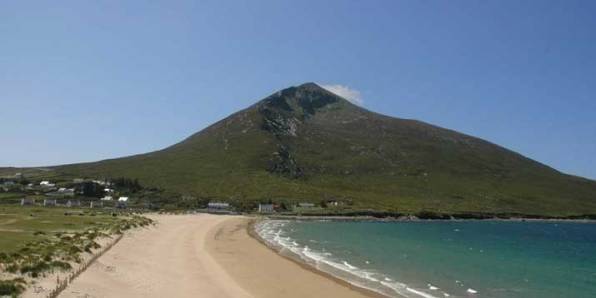
‘Blue Flag’ opens with Yeats fully in evidence: “On Golden Strand sounds Yeatsian enough”. But the landscape is so “penny-perfect” one’s first thought is to take a photo and post it on Facebook’s “show- / and-tell, the hell that’s other people’s holidays”. Yet the narrator sticks with his Yeatsian model and, in alluding to that poet’s 1914 collection Responsibilities, he tries to get himself back on track: “I’m here to write, / and waves break into words”. And words linked to landscape – in ways characteristic of Greening, a poet so attuned to the power of music – are found to turn to the musical notes of a poem draft: “On Golden Strand / I touch a silent fingerboard of sand”.
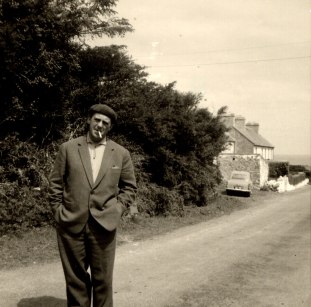
Yeats also provides the title for the tenth sonnet, ‘A Vision’ and, though the view of Slievemore seems appropriate, the poem’s opening lines set about debunking anything too aspirational. The fit and healthy young may be keen to “climb / and conquer” such heights but the narrator/poet suffers with his “medieval knees” and is mercifully free of the desire to try the ascent. I can hear Boll being channelled in these lines:
Let it be there
because it’s there. Pain will be no less real
among bandaging clouds.
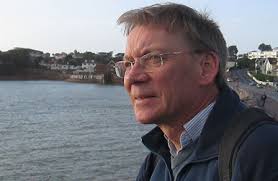
Greening’s sonnet forms are presented in 14 line blocks and he often runs through quatrain divisions to achieve a fluidity of thought, reflecting the mind’s energy, moving and connecting one thing to another. He also tends to play fast and loose with the traditional volta. So there are few moments of mannered pausing and this again gives the sense of the pressure of things needing to be recorded in a diaristic fashion. The shift in ‘A Vision’ comes halfway through line 8 as the narrator grudgingly admits to feeling something of the allure of misty mountain uplands, particularly when they are “theatrically lit”:
I can be driven
to dress up, drawn towards their footlit dream
like a painted hero, as if I’d been given
a walk-on through the dense mythologies
in one of Lady Gregory’s short plays.
In contrast, Boll’s dry, attentive, inspector’s gaze seems more evident in a poem like ‘Eine Familie’. Here Greening’s 14 lines combine outer observations, inner thoughts, awkward dialogue and self-deprecating humour as the preoccupied artist-in-residence (he’s just been to the grocery store) meets a family of bike-riding tourists. The opening line treats them to the single poetic figure in the whole poem, while the rest of the quatrain establishes the wry, stilted quality of the encounter:
Like bright, caged birds they’re perching on their bikes
beside the plaque. I manage to sound jolly.
‘A fan of Heinrich Boll?’ The father speaks
with a certain awkwardness. ‘Not really.’
Dialogue is also vividly presented in ‘Dooagh’, though on this occasion the talk is fragmented, full of lacunae, because of the racket of a wake taking place in the bar where the narrator attempts conversation with two people, both called Kevin.
Another line comes through,
from a second Kevin, a Vietnamese
translator. I grasp at it, and try to say
how once . . . Boat people . . . refugees . . . but the seas
of song and sentiment must have their way.
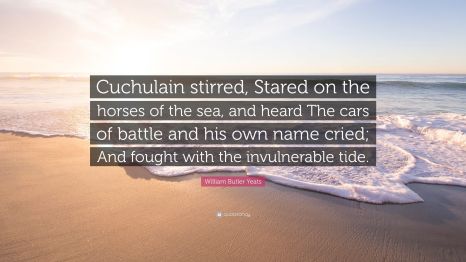
A contrastingly more quiet and creative kind of music is in evidence in ‘Accompaniment’. As in ‘Blue Flag’, this is again the music of the ocean that plays constantly “at [his] left hand” as the narrator sits and writes with his right. The kind of artistic success this facilitates is clear in the best poem in the book, ‘Cuchulain’. The title alludes to one of Yeats’ favourite mythological figures, as in the early poem ‘Cuchulain’s Fight with the Sea’ in which he wrestles against “the invulnerable tide”. After earthing the sonnet in particularity – a brief dip in the ocean at Keel Beach – Greening’s thoughts turn to his father’s love of swimming, this particular family’s memory/mythology preserved on old cine film. The fluidity and ease of the handling of these sonnets pays dividends here. Crossing a belated volta, the poem begins deeper reflections on the father-son relationship: “I never fought with him. Should we have done?” Within a couple of lines, we seem to have a portrait of unspoken tensions, perhaps a taciturn son and a stoical father who was not inclined to “rave as infirmities kept coming on / in wave upon wave.” As old age took its toll, it seems the option of a heroic struggle a la Cuchulain (or as urged in Dylan Thomas’s ‘Do Not Go Gentle Into that Goodnight’) was not taken up. The son is pained by his father’s choice of resignation (if choice it was) and it is the irredeemable nature of time and personal extinction that strikes the deepest note in this superbly intelligent, delightfully readable and lovingly produced limited edition from Red Fox Press.
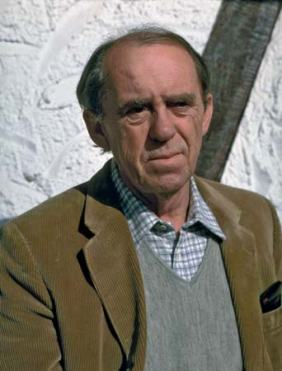
Reblogged this on Carolyn O' Connell.
LikeLike
Thanks Carolyn
LikeLike